.gif)
Fortuna (mythology)
Encyclopedia
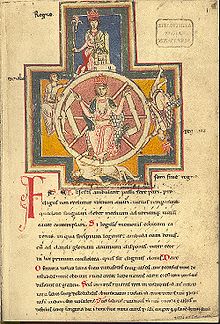
Luck
Luck or fortuity is good fortune which occurs beyond one's control, without regard to one's will, intention, or desired result. There are at least two senses people usually mean when they use the term, the prescriptive sense and the descriptive sense...
in Roman religion
Religion in ancient Rome
Religion in ancient Rome encompassed the religious beliefs and cult practices regarded by the Romans as indigenous and central to their identity as a people, as well as the various and many cults imported from other peoples brought under Roman rule. Romans thus offered cult to innumerable deities...
. She might bring good luck or bad: she could be represented as veiled and blind, as in modern depictions of Justice
Justice
Justice is a concept of moral rightness based on ethics, rationality, law, natural law, religion, or equity, along with the punishment of the breach of said ethics; justice is the act of being just and/or fair.-Concept of justice:...
, and came to represent life's capriciousness. She was also a goddess of fate
Destiny
Destiny or fate refers to a predetermined course of events. It may be conceived as a predetermined future, whether in general or of an individual...
: as Atrox Fortuna, she claimed the young lives of the princeps
Princeps
Princeps is a Latin word meaning "first in time or order; the first, chief, the most eminent, distinguished, or noble; the first man, first person."...
Augustus
Augustus
Augustus ;23 September 63 BC – 19 August AD 14) is considered the first emperor of the Roman Empire, which he ruled alone from 27 BC until his death in 14 AD.The dates of his rule are contemporary dates; Augustus lived under two calendars, the Roman Republican until 45 BC, and the Julian...
' grandsons Gaius
Gaius Caesar
Gaius Julius Caesar , most commonly known as Gaius Caesar or Caius Caesar, was the oldest son of Marcus Vipsanius Agrippa and Julia the Elder...
and Lucius
Lucius Caesar
Lucius Julius Caesar , most commonly known as Lucius Caesar, was the second son of Marcus Vipsanius Agrippa and Julia the Elder. He was born between 14 of June and 15 July 17 BC with the name Lucius Vipsanius Agrippa, but when he was adopted by his maternal grandfather Roman Emperor Caesar...
, prospective heirs to the Empire.
Her father was said to be Jupiter and like him, she could also be bountiful (Copia
Copia
Copia may refer to:* Copia , the ancient city also called Thurii* Copia , an ancient city in Boeotia.* copia, a Latin word for "abundance", especially used in rhetoric...
). As Annonaria she protected grain supplies. June 11 was sacred to her: on June 24 she was given cult at the festival of Fors Fortuna.
Cult
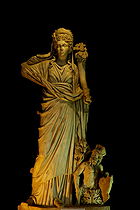
Servius Tullius
Servius Tullius was the legendary sixth king of ancient Rome, and the second of its Etruscan dynasty. He reigned 578-535 BC. Roman and Greek sources describe his servile origins and later marriage to a daughter of Lucius Tarquinius Priscus, Rome's first Etruscan king, who was assassinated in 579 BC...
– whose exceptional good fortune suggested their sexual intimacy – and to Ancus Marcius
Ancus Marcius
Ancus Marcius was the legendary fourth of the Kings of Rome.He was the son of Marcius and Pompilia...
. She had a temple at the Forum Boarium
Forum Boarium
The Forum Boarium was the cattle forum venalium of Ancient Rome and the oldest forum that Rome possessed. It was located on a level piece of land near the Tiber between the Capitoline, the Palatine and Aventine hills. Here, too, is where the first bridges were built...
and a sacred precinct on the Quirinalis as Fortuna Populi Romani (the Fortune of the Roman people). Her identity as personification of chance events was closely tied to virtus
Virtus (virtue)
Virtus was a specific virtue in Ancient Rome. It carries connotations of valor, manliness, excellence, courage, character, and worth, perceived as masculine strengths...
(strength of character). Public officials who lacked virtues invited ill-fortune on themselves and Rome: Sallust
Sallust
Gaius Sallustius Crispus, generally known simply as Sallust , a Roman historian, belonged to a well-known plebeian family, and was born at Amiternum in the country of the Sabines...
uses the infamous Catiline
Catiline
Lucius Sergius Catilina , known in English as Catiline, was a Roman politician of the 1st century BC who is best known for the Catiline conspiracy, an attempt to overthrow the Roman Republic, and in particular the power of the aristocratic Senate.-Family background:Catiline was born in 108 BC to...
as illustration – "Truly, when in the place of work, idleness, in place of the spirit of measure and equity
Temperance (virtue)
Temperance has been studied by religious thinkers, philosophers, and more recently, psychologists, particularly in the positive psychology movement. It is considered a virtue, a core value that can be seen consistently across time and cultures...
, caprice and pride invade, fortune is changed just as with morality".
An oracle
Oracle
In Classical Antiquity, an oracle was a person or agency considered to be a source of wise counsel or prophetic predictions or precognition of the future, inspired by the gods. As such it is a form of divination....
at the Temple of Fortuna Primigena in Praeneste used a form of divination in which a small boy picked out one of various futures that were written on oak
Oak
An oak is a tree or shrub in the genus Quercus , of which about 600 species exist. "Oak" may also appear in the names of species in related genera, notably Lithocarpus...
rods. Cults to Fortuna in her many forms are attested throughout the Roman world. Dedications have been found to Fortuna Dubia (doubtful fortune), Fortuna Brevis (fickle or wayward fortune) and Fortuna Mala (bad fortune).
She is found in a variety of domestic and personal contexts. During the early Empire, an amulet from the House of Menander
House of Menander
The House of Menander is a building in Pompeii, Italy. It is located in the southern half of the town, just northeast of the Little and Large Theaters, as well as the Gladiators’ barracks...
in Pompeii
Pompeii
The city of Pompeii is a partially buried Roman town-city near modern Naples in the Italian region of Campania, in the territory of the comune of Pompei. Along with Herculaneum, Pompeii was destroyed and completely buried during a long catastrophic eruption of the volcano Mount Vesuvius spanning...
links her to the Egyptian goddess Isis
Isis
Isis or in original more likely Aset is a goddess in Ancient Egyptian religious beliefs, whose worship spread throughout the Greco-Roman world. She was worshipped as the ideal mother and wife as well as the matron of nature and magic...
, as Isis-Fortuna. She is functionally related to the God Bonus Eventus, who is often represented as her counterpart: both appear on amulet
Amulet
An amulet, similar to a talisman , is any object intended to bring good luck or protection to its owner.Potential amulets include gems, especially engraved gems, statues, coins, drawings, pendants, rings, plants and animals; even words said in certain occasions—for example: vade retro satana—, to...
s and intaglio engraved gems across the Roman world.
Her name seems to derive from Vortumna (she who revolves the year): the earliest reference to the Wheel of Fortune
The Wheel of Fortune
The Wheel of Fortune, or Rota Fortunae, is a concept in medieval and ancient philosophy referring to the capricious nature of Fate. The wheel belongs to the goddess Fortuna, who spins it at random, changing the positions of those on the wheel - some suffer great misfortune, others gain windfalls...
, emblematic of the endless changes in life between prosperity and disaster, is 55 BCE. In Seneca
Seneca the Younger
Lucius Annaeus Seneca was a Roman Stoic philosopher, statesman, dramatist, and in one work humorist, of the Silver Age of Latin literature. He was tutor and later advisor to emperor Nero...
's tragedy Agamemnon, a chorus addresses Fortuna in terms that would remain almost proverbial, and in a high heroic ranting mode that Renaissance writers would emulate:
Ovid
Ovid
Publius Ovidius Naso , known as Ovid in the English-speaking world, was a Roman poet who is best known as the author of the three major collections of erotic poetry: Heroides, Amores, and Ars Amatoria...
's description is typical of Roman representations: in a letter from exile he reflects ruefully on the "goddess who admits by her unsteady wheel her own fickleness; she always has its apex beneath her swaying foot."
Middle Ages

Consolation of Philosophy
Consolation of Philosophy is a philosophical work by Boethius, written around the year 524. It has been described as the single most important and influential work in the West on Medieval and early Renaissance Christianity, and is also the last great Western work that can be called Classical.-...
, by statesman and philosopher Boethius
Anicius Manlius Severinus Boethius
Anicius Manlius Severinus Boëthius, commonly called Boethius was a philosopher of the early 6th century. He was born in Rome to an ancient and important family which included emperors Petronius Maximus and Olybrius and many consuls. His father, Flavius Manlius Boethius, was consul in 487 after...
, written while he faced execution, reflected the Christian theology of casus, that the apparently random and often ruinous turns of Fortune's Wheel are in fact both inevitable and providential, that even the most coincidental events are part of God's hidden plan which one should not resist or try to change. Fortuna, then, was a servant of God, and events, individual decisions, the influence of the stars
Astrology
Astrology consists of a number of belief systems which hold that there is a relationship between astronomical phenomena and events in the human world...
were all merely vehicles of Divine Will. In succeeding generations Boethius' Consolation was required reading for scholars and students. Fortune crept back in to popular acceptance, with a new iconographic trait, "two-faced Fortune", Fortuna bifrons; such depictions continue into the 15th century.
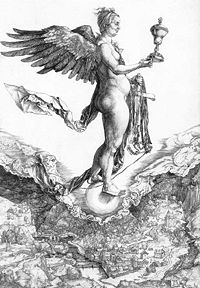
The Wheel of Fortune
The Wheel of Fortune, or Rota Fortunae, is a concept in medieval and ancient philosophy referring to the capricious nature of Fate. The wheel belongs to the goddess Fortuna, who spins it at random, changing the positions of those on the wheel - some suffer great misfortune, others gain windfalls...
found throughout the Middle Ages and beyond was a direct legacy of the second book of Boethius's Consolation. The Wheel appears in many renditions from tiny miniatures in manuscripts
Illuminated manuscript
An illuminated manuscript is a manuscript in which the text is supplemented by the addition of decoration, such as decorated initials, borders and miniature illustrations...
to huge stained glass windows in cathedrals, such as at Amiens
Amiens
Amiens is a city and commune in northern France, north of Paris and south-west of Lille. It is the capital of the Somme department in Picardy...
. Lady Fortune is usually represented as larger than life to underscore her importance. The wheel characteristically has four shelves, or stages of life, with four human figures, usually labeled on the left regnabo (I shall reign), on the top regno (I reign) and is usually crowned, descending on the right regnavi (I have reigned) and the lowly figure on the bottom is marked sum sine regno (I have no kingdom). Medieval representations of Fortune emphasize her duality and instability, such as two faces side by side like Janus
Janus (mythology)
In ancient Roman religion and mythology, Janus is the god of beginnings and transitions, thence also of gates, doors, doorways, endings and time. He is usually a two-faced god since he looks to the future and the past...
; one face smiling the other frowning; half the face white the other black; she may be blindfolded but without scales, blind to justice. She was associated with the cornucopia
Cornucopia
The cornucopia or horn of plenty is a symbol of abundance and nourishment, commonly a large horn-shaped container overflowing with produce, flowers, nuts, other edibles, or wealth in some form...
, ship's rudder, the ball and the wheel. The cornucopia is where plenty flows from, the Helmsman's rudder steers fate, the globe symbolizes chance (who gets good or bad luck), and the wheel symbolizes that luck, good or bad, never lasts.
Fortune would have many influences in cultural works throughout the Middle Ages. In Le Roman de la Rose, Fortune frustrates the hopes of a lover who has been helped by a personified character "Reason". In Dante's Inferno (vii.67-96) Virgil
Virgil
Publius Vergilius Maro, usually called Virgil or Vergil in English , was an ancient Roman poet of the Augustan period. He is known for three major works of Latin literature, the Eclogues , the Georgics, and the epic Aeneid...
explains the nature of Fortune, both a devil and a ministring angel, subservient to God. Boccaccio
Giovanni Boccaccio
Giovanni Boccaccio was an Italian author and poet, a friend, student, and correspondent of Petrarch, an important Renaissance humanist and the author of a number of notable works including the Decameron, On Famous Women, and his poetry in the Italian vernacular...
's De Casibus Virorum Illustrium ("The Fortunes of Famous Men"), used by John Lydgate
John Lydgate
John Lydgate of Bury was a monk and poet, born in Lidgate, Suffolk, England.Lydgate is at once a greater and a lesser poet than John Gower. He is a greater poet because of his greater range and force; he has a much more powerful machine at his command. The sheer bulk of Lydgate's poetic output is...
to compose his Fall of Princes, tells of many where the turn of Fortune's wheel brought those most high to disaster, and Boccaccio essay De remedii dell'una e dell'altra Fortuna, depends upon Boethius for the double nature of Fortuna. Fortune makes her appearance in Carmina Burana
Carmina Burana
Carmina Burana , Latin for "Songs from Beuern" , is the name given to a manuscript of 254 poems and dramatic texts mostly from the 11th or 12th century, although some are from the 13th century. The pieces were written principally in Medieval Latin; a few in Middle High German, and some with traces...
(see image). The Christianized Lady Fortune is not autonomous: illustrations for Boccaccio's Remedii show Fortuna enthroned in a triumphal car with reins that lead to heaven, and appears in chapter 25 of Machiavelli's The Prince
The Prince
The Prince is a political treatise by the Italian diplomat, historian and political theorist Niccolò Machiavelli. From correspondence a version appears to have been distributed in 1513, using a Latin title, De Principatibus . But the printed version was not published until 1532, five years after...
, in which he says Fortune only rules one half of men's fate, the other half being of their own will. Machiavelli reminds the reader that Fortune is a woman, that she favours a strong, or even violent hand, and that she favours the more aggressive and bold young man than a timid elder. Even Shakespeare
William Shakespeare
William Shakespeare was an English poet and playwright, widely regarded as the greatest writer in the English language and the world's pre-eminent dramatist. He is often called England's national poet and the "Bard of Avon"...
was no stranger to Lady Fortune:
- When in disgrace with Fortune and men's eyes
- I all alone beweep my outcast state ... — Sonnet 29Sonnet 29Sonnet 29 is one of 154 sonnets written by the English playwright and poet William Shakespeare. This is one of his more ambiguous sonnets: one does not know who the speaker is referring to or if the word "love" in this sonnet refers to a romantic love or a platonic love.- Structure of Sonnet 29...
Pars Fortuna in Astrology
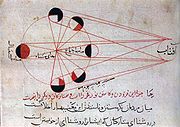
Astrology
Astrology consists of a number of belief systems which hold that there is a relationship between astronomical phenomena and events in the human world...
the term ‘Pars Fortuna’ represents a mathematical point in the zodiac
Zodiac
In astronomy, the zodiac is a circle of twelve 30° divisions of celestial longitude which are centred upon the ecliptic: the apparent path of the Sun across the celestial sphere over the course of the year...
derived by the longitudinal positions of the Sun
Sun
The Sun is the star at the center of the Solar System. It is almost perfectly spherical and consists of hot plasma interwoven with magnetic fields...
, Moon
Moon
The Moon is Earth's only known natural satellite,There are a number of near-Earth asteroids including 3753 Cruithne that are co-orbital with Earth: their orbits bring them close to Earth for periods of time but then alter in the long term . These are quasi-satellites and not true moons. For more...
and Ascendant
Ascendant
The ascendant , or rising sign, is the zodiacal sign and degree that was ascending on the eastern horizon at the specific time and location of an event. According to astrological theory, celestial phenomena reflect or determine human activity on the principle of 'as above so below'...
(Rising sign) in the birth chart of an individual. It represents an especially beneficial point in the horoscopic chart. In Arabic Astrology
Astrology
Astrology consists of a number of belief systems which hold that there is a relationship between astronomical phenomena and events in the human world...
, this point is called Arabian Parts
Arabian Parts
In astrology, the Arabian/Arabic parts or lots are constructed points based on mathematical calculations of three horoscopic entities such as planets or angles...
.
The procedure followed for fixing one’s Pars Fortuna in ancient and traditional astrology depended on the time of birth, viz., during daylight or night time (whether the Sun was above or below the horizon
Horizon
The horizon is the apparent line that separates earth from sky, the line that divides all visible directions into two categories: those that intersect the Earth's surface, and those that do not. At many locations, the true horizon is obscured by trees, buildings, mountains, etc., and the resulting...
). In modern western astrology
Western astrology
Western astrology is the system of astrology most popular in Western countries. Western astrology is historically based on Ptolemy's Tetrabiblos , which in turn was a continuation of Hellenistic and ultimately Babylonian traditions....
the day time formula only was used for many years, but with more knowledge of ancient astrology, the two calculation methods are now often used.
The formula for calculating the day time Part of Fortune (PF) is (using the 360 degree positions for each point):
PF = Ascendant + Moon
Moon
The Moon is Earth's only known natural satellite,There are a number of near-Earth asteroids including 3753 Cruithne that are co-orbital with Earth: their orbits bring them close to Earth for periods of time but then alter in the long term . These are quasi-satellites and not true moons. For more...
- Sun
Sun
The Sun is the star at the center of the Solar System. It is almost perfectly spherical and consists of hot plasma interwoven with magnetic fields...
The formula for the night-time Part of Fortune is PF = Ascendant + Sun - Moon
Each calculation method results in a different zodiac
Zodiac
In astronomy, the zodiac is a circle of twelve 30° divisions of celestial longitude which are centred upon the ecliptic: the apparent path of the Sun across the celestial sphere over the course of the year...
position for the Part of Fortune
Arabian Parts
In astrology, the Arabian/Arabic parts or lots are constructed points based on mathematical calculations of three horoscopic entities such as planets or angles...
.
Al Biruni (973 – 1048), an 11th-century mathematician, astronomer and scholar, who was the greatest proponent of this system of prediction, listed a total of 97 Arabic Parts, which were widely used for astrological consultations. Paul Vachier has prepared an Arabic Parts Calculator for all the Arabic Parts.
Aspects of Fortuna
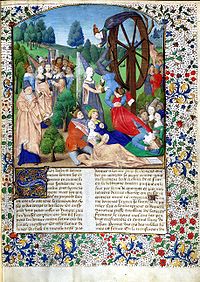
- Fortuna Annonaria brought the luck of the harvest
- Fortuna Belli the fortune of war
- Fortuna Primigenia directed the fortune of a firstborn child at the moment of birth
- Fortuna Virilis attended a man's career
- Fortuna Redux brought one safely home
- Fortuna Respiciens the fortune of the provider
- Fortuna Muliebris the luck of a woman. Typical of Roman attitudes, the fortune of a woman in marriage, however, was Fortuna Virilis.
- Fortuna Victrix brought victory in battle
- Fortuna Augusta the fortune of the emperor
- Fortuna Balnearis the fortune of the baths.
- Fortuna Conservatrix the fortune of the Preserver
- Fortuna Equestris fortune of the Knights.
- Fortuna Huiusque fortune of the present day.
- Fortuna Obsequens fortune of indulgence.
- Fortuna Privata fortune of the private individual.
- Fortuna Publica fortune of the people.
- Fortuna Romana fortune of Rome.
- Fortuna Virgo fortune of the virgin.
- Pars Fortuna
See also
- The Wheel of FortuneThe Wheel of FortuneThe Wheel of Fortune, or Rota Fortunae, is a concept in medieval and ancient philosophy referring to the capricious nature of Fate. The wheel belongs to the goddess Fortuna, who spins it at random, changing the positions of those on the wheel - some suffer great misfortune, others gain windfalls...
- Fortune favours the boldFortune favours the boldFortune favors the bold, Fortune favors the brave, Fortune helps the brave, and Fortune favors the strong are common translations of the Latin proverb "Fortes fortuna adiuvat" .- Origins :...
- Carmina Burana (Orff)Carmina Burana (Orff)Carmina Burana is a scenic cantata composed by Carl Orff in 1935 and 1936. It is based on 24 of the poems found in the medieval collection Carmina Burana...
(opening theme: O Fortuna) - Goth's Column
External links
- Michael Best, "Medieval tragedy" |series=Theses and Dissertations from The University of Texas at Austin |date=January 27, 2006 |publisher=University of Texas at Austin |location=Austin }}

